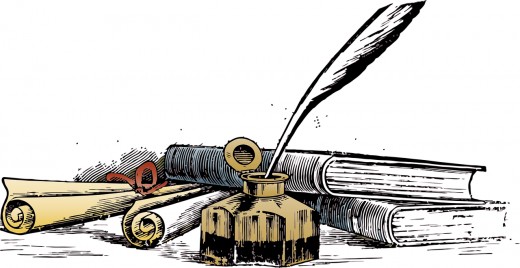
As far as literature is concerned, especially "popular literature", poetry tends to get a bad rap.
This can be blamed on a number of things but often stems from children and adolescents being forced to study and analyse the poems of notable past poets like Shakespeare, Frost, Keats, Shelley, Browning etc.
I am not saying these famous poets were not skilful wordsmiths and literary greats of their day, but with so many wonderful contemporary poets the early teaching of poetry would be better focussed on their work. This would appeal more, and be much more relatable to the young people of today.
Just a few of the more contemporary and living poets more worthy of study include: Robert Adamson, Maya Angelou, Elizabeth Bishop, Allen Ginsberg, Ogden Nash, Pablo Neruda, Shel Silverstein and Richard Wilbur.
In Defence of Poetry
The mistake many people make is that they tend to treat poetry like short fiction stories. In fact, poetry should not be read in the same way as a story. It is more like a song and should be appreciated in that way. Just like you listen to a favourite song over and over to obtain the full appreciation of it, you need to read a poem repeatedly. You should also read the poem aloud, at least once, to allow it to impart its full impact on you.
Many songs are just poems put to music and singer/songwriters like Bob Dylan and Don McLean can easily be described as poets.
Most people are too busy for this and would rather spend time reading a 2000 word article on the Internet than on a 200 word poem even though the poem probably required much more time and skill for the writer to construct than the article did.
D.E.Navarro (author of Dare to Soar) says:
"Poetry does not simply convey information to our minds, like a story, but actually imparts itself..... Poets are philosophers who write, and most philosophers are poets who can't."
My Personal Favourite Poets
One of my all-time favourite poets, though vastly underrated, I feel, was Rudyard Kipling. A famous excerpt and fine example of his poetry is:
"Now this is the Law of the Jungle -- as old and as true as the sky;
And the Wolf that shall keep it may prosper, but the Wolf that shall break it must die.
As the creeper that girdles the tree-trunk the Law runneth forward and back --
For the strength of the Pack is the Wolf, and the strength of the Wolf is the Pack." (from The Law of the Jungle)
Another, and possibly my favourite of all his many poems is The Female of the Species.
Running a close second, or even equal first place would be fellow Aussie and Bush Poet, A.B. Banjo Paterson. The most famous of his poems being the iconic Waltzing Matilda, The Man From Snowy River, and Clancy of the Overflow.
To Rhyme ...
From the viewpoint of anyone who is really serious about poetry--rhyme is one of the deepest and most beautiful elements of the craft. Getting it right is like composing a symphony. Take for example these lines from a couple of famous poems:
"If we had but world enough, and time
This coyness, lady, were no crime."
or
"The grave's a fine and secret place,
But none, I think, do there embrace."
There is nothing not to like about rhyme when it is handled well.
The problem with rhyme is that it is really hard to execute well, and after a time all the rhymes have been used, especially in English.
Many publishers today, and so-called poetry experts, believe rhyming makes poetry forced or unnatural (though I admit it can sometimes happen) in my opinion it is more challenging to write a rhyming poem than free verse, and though it may not be quite as fluid, it is the rhyming makes it beautiful.
If Henry Wadsworth Longfellow, or any of the other fine traditional rhyming poets of the past, were alive today, they might find it difficult to get their work published in today’s predominantly free-verse markets.
To write rhyming poetry that transcends mere childhood nursery rhymes, we must understand the importance of alliteration, assonance, and consonance and what they can bring to our work. These elements of rhyme become useful tools when used effectively.
Rhyme does not have to be an ABAB or AABB rhyme scheme. A typical rhyme scheme may look like this:
I went to the store
To buy some bread
But I found something more
A hat for my head.
In the example above, store/more and bread/head are examples of perfect rhyme (when the words sound the same because of the last syllable). Many poets are reluctant to attempt perfect rhyme since they risk writing poems that sound forced or even clichéd. Mastering the different types of rhyme beyond ABAB or AABB improves poetry techniques and also creates a more sophisticated style of poem.
While perfect rhyme is often found at the end of a line, there are a number of ways good rhyming poetry makes use of other kinds of rhyme. Internal rhyme is rhyme that occurs in a single line of verse. Internal rhyme is a more subtle way of creating rhyming poetry. Edgar Allan Poe provided an excellent example of internal rhyme in “The Raven":
Once upon a midnight dreary, while I pondered, weak and weary,
Over many a quaint and curious volume of forgotten lore,
While I nodded, nearly napping, suddenly there came a tapping,
As of someone gently rapping, rapping at my chamber door.
“’Tis so
No posts
No posts
No posts
No posts

Comments